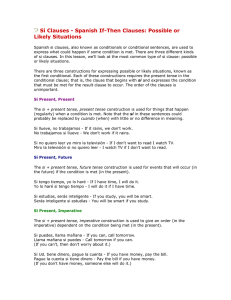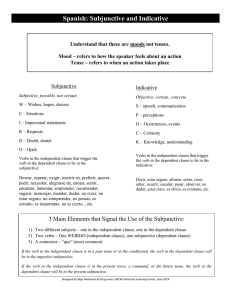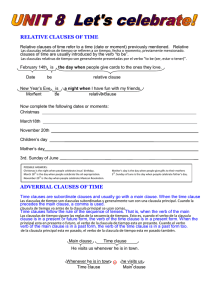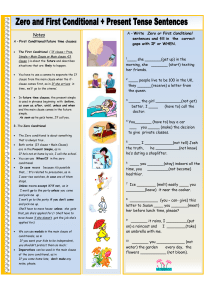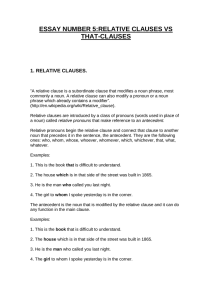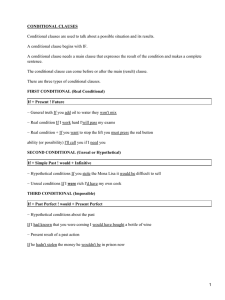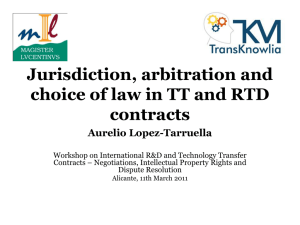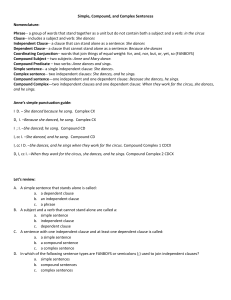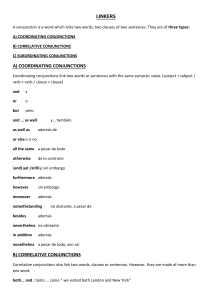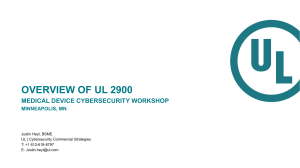INGLÉS JURÍDICO PARA LA CONTRATACIÓN INTERNACIONAL
Anuncio
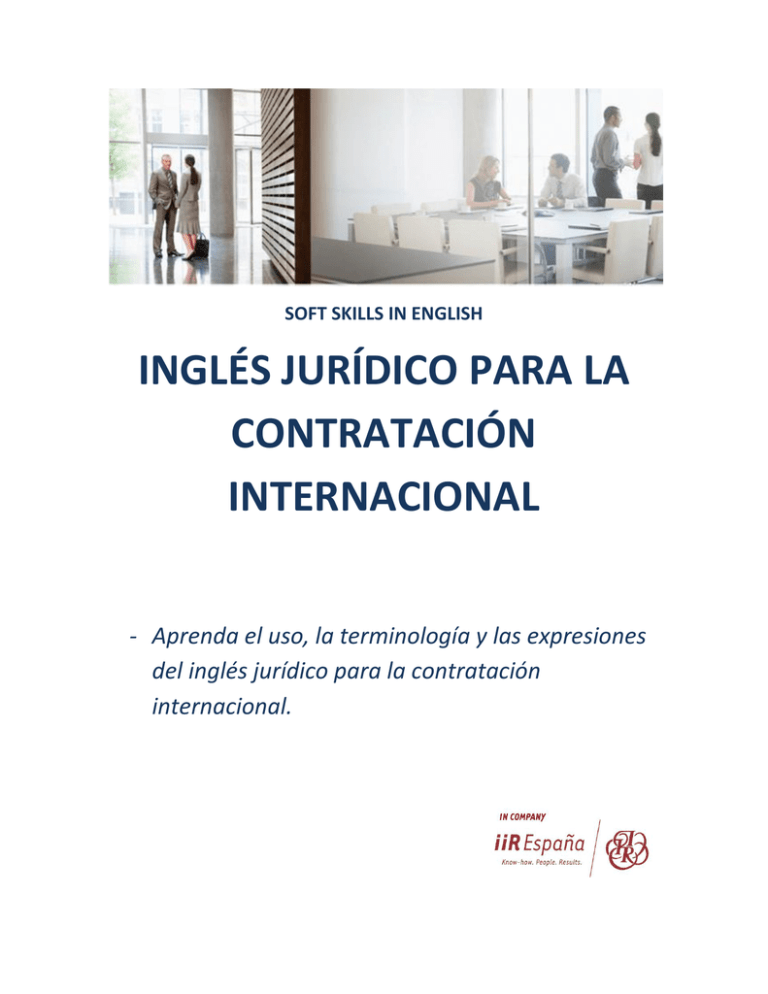
SOFT SKILLS IN ENGLISH
INGLÉS JURÍDICO PARA LA
CONTRATACIÓN
INTERNACIONAL
- Aprenda el uso, la terminología y las expresiones
del inglés jurídico para la contratación
internacional.
TOPICS
I. Language advice
Style advice
a.
b.
c.
d.
e.
f.
Relatively short sentences and paragraphs
Plenty of white space
Active verbs
Few adjectives and adverbs
English is simpler than Spanish. Your English should be extremely simple
Number and/or alphabetize all paragraphs/subparagraphs etc. so that each section can be
conveniently cited
Use and misuse of technical legal terms: refrain from using technical terms if you are not certain of
their meaning and proper usage
II. The basics of the anglo-american contract
For the Anglo-American legal contract, there rarely is aneed to cite a lot of legislation or to
register contracts.
Government Influence: Common Law/Civil Law.
a.
b.
c.
d.
e.
f.
Tradition/Stare Decisis
Public Policy: e.g. Labor Law (Civil Law protects jobs!)
Common Law and consumers
Tendency to enforce more Contracts at Civil than at Common Law
Greater use of extraneous and parole evidence at Civil Law
Role of Jury (Evidence/Parole Evidence)
Identify Parties Thoroughly
Foreword (Premessa): State reason for the Contract
a. ('Whereas...'-but you certainly do not have to use this word)
b. 'Why are we here?' 'Why do we want to conclude this contract'. This should be a very
short story, not a novel
Offer/Acceptance/Purpose/Consideration: in detail, what are the parties giving to or doing for
each other, i.e., money or some other 'quid pro quo'
Counteroffers: Battle of the Forms
Contracts of adhesion or shrinkwraps (for big complex deals nowadays, there is more negotiation,
than offer/acceptance)
Is Contract for a Legal Purpose?
'Essential Terms' of a Deal: quantity, quality, price, when delivered, where delivered, who delivers,
who insures, when payment, how payment?
What happens when there is Ambiguity in the Contract?
a. Court intervention to imply a contract or to throw out a contract
b. Even for essential terms such as price, the court/adjudicator may intervene
c. Importance of prior dealing
In the interests of (or against whom) should the ambiguities in a Contract be interpreted?
Letter of acceptance
'Anonymous' signatures: who signed
III. Principal contract clauses
Dispute Resolution Clause: Mediation, Arbitration, Litigation Clauses
'Whole Contract' or 'Entire Agreement' –so–called 'Integration Clauses'
Choice of Law Clauses: Vienna Convention on the International Sale of Goods 'CISG', Brussels
Convention on Jurisdiction, Lex Mercatoria, INCOTERMS
Avoid Penalty Clauses
Payment Clause
Controlling Language Clause if the contract is in more than one language
Number of Originals or Counterparts Clause
Where to send Notices Clause
Assignment of Rights/Delegation of Duties
Condition Precedent/Condition Subsequent
Force Majeure
a. Explain your own definition of this term
b. What occurrences do you wish to include?
Related doctrines 'Frustration' and 'Duress' and Reliance' damages
What do we mean when we say 'doctrine' in common law?
Optional Clauses
a.
b.
c.
d.
e.
f.
Legal/Attorney’s Fees Clause
Consequential Damages Clause (Liable or not liable for)
Interpretation of Headings Clause
Definitions Clause
Represent and Warrant Clause
Good Faith Clause (as opposed to Bad Faith-the standard is an objective one: what does
the reasonable man think?)
g. Disclaimer (of liability) Clause
h. Payment of Taxes Clause
i. Export/Import Permits
j. Time is of the Essence Clause
IV. Fundamentals of negotiation
Fundamentals of Negotiation
a. Communication in a cross-cultural environment (misunderstandings)
b. Importance of knowing and using your 'Best Alternative to a Negotiated Agreement'
(BATNA) in negotiations
c. Win/Win... creating value: be hard on the problem, not on the opponent.
Pre-Contract: Letter of Intent/Memorandum of Understanding/ Letter of Comfort
a. What purpose?
b. Importance of correct wording: It does not matter so much what you call it as it does what
the document says
c. How to avoid having your intentions misinterpreted
d. Negotiating in good faith vs. in bad faith
V. Breach/avoidance of contract and after
For what reasons can one breach/avoid and how should one communicate it?
How much time? What the contract says or, what is 'reasonable' under the circumstances
Minimize damages
The Reasonable Man
VI. ADR/International contract litigation: The importance of dispute resolution in the
international context
Arbitration/mediation ADR have to be considered viable alternatives
Discuss Arbitration/ADR vs. Litigation
Examine the drafting of dispute resolution clauses: negotiation, mediation, arbitration
BENEFICIOS
Evite malentendidos en sus contratos internacionales a través de una terminología libre de
ambigüedades
Conozca paso a paso el proceso de la contratación internacional en inglés
Identifique y elimine los errores más habituales en el uso del inglés en los contratos
Aprenda las claves de la terminología jurídica en el ámbito del Derecho Angloamericano
Consiga sus objetivos en la negociación del contrato con las expresiones más efectivas del inglés
METODOLOGÍA
Nuestra formación es dinámica y combina la exposición de los temas con herramientas de
enseñanza interactivas, casos prácticos, simulaciones y role-playing para asegurar que los
participantes aprendan mientras practican.
Dicha metodología está basada en el concepto de learning by doing o aprendizaje a través de la
experiencia. Este concepto se concretará a través del desarrollo de casos prácticos.
Esto permite a los asistentes adquirir experiencia sobre el terreno, permitiéndoles ejercitar y
aplicar la teoría, conceptos y principios de la gestión de proyectos en situaciones reales. Los
asistentes se dividirán en grupos interactivos que irán desarrollando todo el caso práctico desde su
inicio hasta el cierre.
Además en algunos de estos cursos se utilizarán herramientas muy avanzadas, útiles para el
conocimiento nuestra forma de liderar, motivar, gestionar equipos y conflictos.
Este programa puede adaptarse en contenidos y horarios de acuerdo a sus necesidades.
Consúltenos una solución formativa a medida en:
Telf. 91 700 49 53 / 39
incompany@iirspain.com

